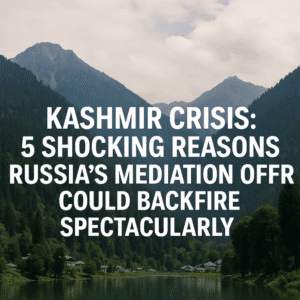Kashmir Crisis: 5 Shocking Reasons Russia’s Mediation Offer Could Backfire Spectacularly
Following a deadly terrorist attack in Kashmir’s Pahalgam region that killed 26 tourists, Russia has proposed mediating between India and Pakistan to defuse tensions—a rare intervention by a global power in the decades-old dispute. Russian Foreign Minister Sergei Lavrov engaged both nations’ diplomats, emphasizing Moscow’s readiness to broker dialogue if both sides consent. While Russia has historically aligned with India as a key arms supplier, its recent outreach to Pakistan signals a strategic pivot to expand influence in South Asia.
However, India’s longstanding rejection of third-party mediation, citing the 1972 Simla Agreement, and Pakistan’s calls for international involvement create a diplomatic stalemate. Analysts view Moscow’s move as an effort to counterbalance China’s regional dominance and rehabilitate its global image amid Ukraine-related isolation. Meanwhile, the attack underscores Kashmir’s fragile stability, with recurring violence devastating local economies reliant on tourism. Experts remain skeptical of progress, citing entrenched mistrust and geopolitical complexities, but acknowledge that Russia’s involvement could incentivize backchannel de-escalation efforts to avert broader conflict.

Kashmir Crisis: 5 Shocking Reasons Russia’s Mediation Offer Could Backfire Spectacularly
In a significant diplomatic overture, Russia has offered to mediate between India and Pakistan to ease escalating tensions over Kashmir, following a devastating terrorist attack in the region’s Pahalgam area on April 22, 2025. The assault, which targeted tourists and claimed 26 lives, has reignited long-standing animosities between the nuclear-armed neighbors. Russian Foreign Minister Sergei Lavrov’s discussions with counterparts in both nations—Pakistan’s Deputy Prime Minister Ishaq Dar and India’s Subrahmanyam Jaishankar—highlight Moscow’s intent to position itself as a peacemaker. But what drives this sudden intervention, and can it yield progress in one of the world’s most intractable conflicts?
Context: A Perennial Flashpoint
Kashmir, a Muslim-majority region divided between India and Pakistan since 1947, remains a tinderbox of territorial disputes, insurgency, and geopolitical rivalry. The recent attack in Pahalgam, a serene tourist hub, underscores how violence continues to destabilize the region, crippling livelihoods tied to tourism and deepening mistrust. India attributes the attack to Pakistan-based militants, a claim Islamabad denies—a pattern echoing past confrontations, such as the 2019 Pulwama bombing.
Russia’s Calculated Diplomacy
Moscow’s mediation offer is notable given its historically close ties with India, a key arms purchaser and strategic partner since the Cold War. However, Russia’s growing engagement with Pakistan—evidenced by energy deals and diplomatic exchanges—suggests a balancing act. By positioning itself as a neutral arbiter, Russia may aim to:
- Bolster Global Influence: Amid its isolation over Ukraine, mediating a high-stakes conflict could rehabilitate Russia’s international image.
- Counterbalance China: With China backing Pakistan through the China-Pakistan Economic Corridor (CPEC), Russia’s move might counter Beijing’s dominance in South Asia while preserving ties with India.
- Prevent Regional Escalation: A renewed India-Pakistan conflict could disrupt trade routes and security dynamics, indirectly affecting Moscow’s interests.
Challenges to Mediation
Third-party mediation in Kashmir has historically faced resistance. India staunchly advocates for bilateral resolution per the 1972 Simla Agreement, rejecting external involvement. Pakistan, meanwhile, has often sought international intervention. Russia’s offer thus faces hurdles:
- Trust Deficit: India may perceive Russia’s overture as overreach, given its reliance on Russian military supplies.
- Complex Geopolitics: Any mediation would require navigating China’s influence in Pakistan and U.S. ties with India.
- Domestic Politics: Both nations face internal pressures; Indian PM Modi’s government has taken a hardline stance on Kashmir, while Pakistan grapples with economic crises.
Human Toll and Economic Fallout
Beyond geopolitics, the Pahalgam attack underscores the human cost of the conflict. Tourism, a lifeline for Kashmir’s economy, has repeatedly been disrupted by violence, exacerbating unemployment and alienation among youth. Sustainable peace is critical not only for security but for revitalizing communities trapped in cycles of violence.
Expert Insights
Analysts remain skeptical of breakthrough prospects. “Russia’s mediation is symbolic,” says South Asia scholar Dr. Harsh Pant. “India’s refusal to entertain third parties is unwavering, and Pakistan’s acceptance would require concessions unlikely from Delhi.” Others note that past mediation attempts, such as U.S. involvement in the 1960s, yielded temporary ceasefires but no lasting solutions.
Looking Ahead
While Russia’s initiative reflects a desire to expand its diplomatic footprint, success hinges on India and Pakistan’s willingness to engage—a scenario currently deemed improbable. However, the offer could open backchannel dialogues or de-escalate military posturing. For lasting peace, experts stress addressing root issues: cross-border terrorism, Kashmiri self-determination demands, and economic disparities.
Conclusion
Russia’s mediation bid in Kashmir is as much about its global aspirations as regional stability. Yet, without mutual trust and political will from India and Pakistan, even well-intentioned efforts risk becoming diplomatic theater. The tragedy in Pahalgam is a grim reminder that beyond statecraft, the urgent need is to protect lives and forge a path where dialogue outweighs violence. As the world watches, one question lingers: Can external players ever resolve a dispute so deeply rooted in history and identity?
You must be logged in to post a comment.